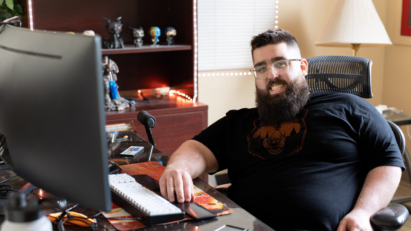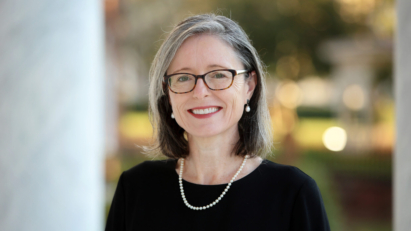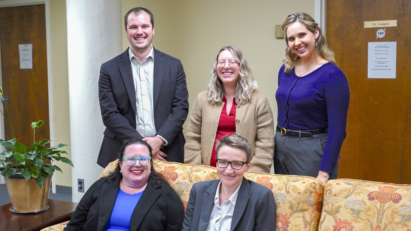Civics Field Placement
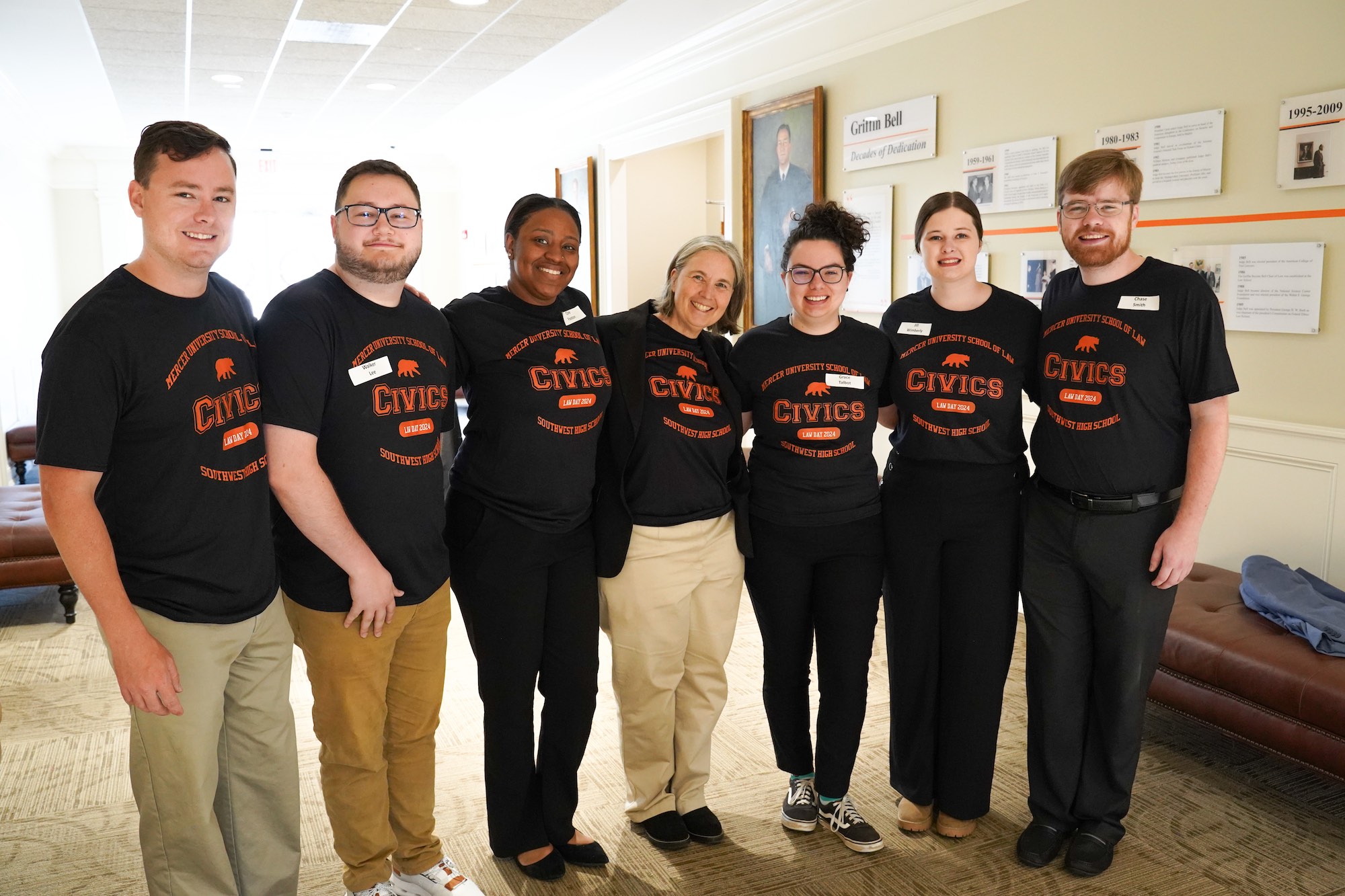
In the fall of 1998, Dr. Gail M. Fowler, then principal at Southwest Magnet High School, created the Southwest Magnet High School and Law Academy to ensure that students in the Bibb County School District had an opportunity to study law and public safety careers at the high school level. It was Dr. Fowler’s vision for the students to use their experiences from the Law Academy to become productive members of society while practicing law or otherwise serving the public.
Today, 26-years later, students at the Law Academy have the opportunity to learn on-site about legal issues, the Bill of Rights, and the branches of government from students who participate in Mercer Law School’s Civics Field Placement (CFP) program. Under the supervision of Mercer Law professors Suzianne Painter-Thorne and Pam Wilkins, and working closely with Law Academy teachers, Mercer law students offer the high school students specialized and interactive instruction on legal issues, hoping to increase their legal literacy and civil engagement. Among other things, students at the Academy learn about the larger legal system and courtroom skills, basic forensic investigative skills (e.g., crime scene analysis), and participate in active mock trial teams. The Mercer students also serve as mentors and role models.
According to Khoriandre Watkins-Ware, career, technical, and agriculture education teacher at Southwest Magnet High School, Mercer Law students are reinforcing students’ knowledge and skills by providing enriching civic education lessons. “The Mercer Law students have a wide range of backgrounds and experiences which enriches the classroom environment and promotes a diverse learning community. They engage our students in thought-provoking and interactive discussions. Not only do the law students teach the students civics education but they also support our Southwest Magnet High School and Law Academy Mock Trial Team and SkillsUSA Chapter. Having Mercer Law students in the classroom brings a diverse range of perspectives, critical thinking skills, and a collaborative learning environment, enhancing the educational experience for all students.”
For the development of the program, Judge Richard W. Story, a senior United States district judge for the Northern District of Georgia, awarded cy pres funds to Mercer Law, and other Georgia law schools, to develop and sustain civics education programs in local schools. Each of the schools designed a program they deem appropriate for their community.
CFP student Chase Smith, ’25, said, “The impact I hope we are making is twofold. At a fundamental level I hope we are instilling some critical thinking skills about how to think about the law as well as an interest in civics. On a more general level I hope that we are teaching the students some practical concepts about what a good constitutional investigation is and what unconstitutional investigation is like – whether it helps them or allows them to help others.”
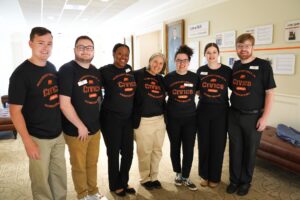 Currently, the CFP course enrollment is limited to eight law students who commit to two semesters: Civics Field Placement I, in which students acquire the skills necessary to teach high school students and Civics Field Placement II, when the students enter the high schools to teach. Professor Painter-Thorne crafted the curriculum for the project.
Currently, the CFP course enrollment is limited to eight law students who commit to two semesters: Civics Field Placement I, in which students acquire the skills necessary to teach high school students and Civics Field Placement II, when the students enter the high schools to teach. Professor Painter-Thorne crafted the curriculum for the project.
In Term One of the course, the law students focus on constitutional and civics concepts most relevant to high school students. They also learn about adolescent development (cognitive, psychological, and social) and about principles for crafting effective lesson plans. A number of experts visit the course, and the law students also visit Southwest High School and meet teachers and students in the Law Academy. One of the law students’ first semester projects is to craft a set of lesson plans focused on constitutional and civics topics.
In Term Two, law students begin teaching the Southwest High students. Law students work directly with teachers who are part of the Law Academy. The students create the lesson plans and teach one to two lessons per week. Law Academy teachers assist and critique, then consult with Professors Wilkins and Painter-Thorne about their progress.
The Academy teachers have been very pleased with the law students’ work. Watkins-Ware said, “We hope our students can take away from the program an understanding of civic engagement and how civic engagement affects their lives currently and in the future; a development of civic habits; and the energy and passion to promote social change. This is our hope because civic engagement plays a vital role in students’ lives by providing them with a deeper understanding of current issues, enhancing their academic performance, improving their social-emotional well-being, and preparing them for future roles as active citizens.”
CFP student Cire Foston, ’25, said the impact she sees is genuinely encouraging. Students, she said, are increasingly engaging in discussions, asking insightful questions, and expressing a keen interest in topics that were once foreign to them. The impact she hopes to have on the high school students is multifaceted. Primarily, to ignite a passion for learning, not just about the law but about how it affects their daily lives and the structure of society. She hopes to demystify the legal system, making it more accessible and understandable, thereby empowering students with the knowledge to navigate it confidently. Additionally, she aims to inspire critical thinking and active engagement in civic duties, encouraging students to become informed, responsible citizens who contribute positively to their communities.
Foston said, “Their growing awareness of their rights and responsibilities, coupled with their enthusiasm for participating in civic activities, is a clear indicator of the positive influence this program is having. I’m particularly moved by the students’ growing confidence in their ability to effect change, both within their immediate environments and in broader societal contexts.”
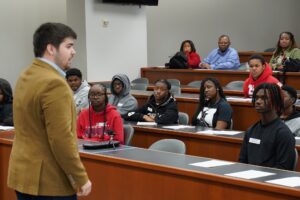 Recently, approximately thirty Law Academy students came to the Law School for a campus tour, a mock class (taught by Professor Painter-Thorne), lunch, and a special mock trial presentation by Law School 3L students Willie Sizemore and Tessa Sizemore. Walker Lee,’24, served as judge. After both sides of the case were presented, Academy students served as jurors, breaking into three groups to deliberate on the appropriate damages remedy for the injured plaintiff. Afterward, Associate Justice of the Supreme Court of Georgia Verda Colvin spoke to the group and encouraged them to work hard, follow their dreams, and to surround themselves with friends and mentors who have their best interests in mind.
Recently, approximately thirty Law Academy students came to the Law School for a campus tour, a mock class (taught by Professor Painter-Thorne), lunch, and a special mock trial presentation by Law School 3L students Willie Sizemore and Tessa Sizemore. Walker Lee,’24, served as judge. After both sides of the case were presented, Academy students served as jurors, breaking into three groups to deliberate on the appropriate damages remedy for the injured plaintiff. Afterward, Associate Justice of the Supreme Court of Georgia Verda Colvin spoke to the group and encouraged them to work hard, follow their dreams, and to surround themselves with friends and mentors who have their best interests in mind.
Painter-Thorne was very impressed with the Academy students’ participation in the classroom discussions. “I thought the students did as well as first-year law students in their thoughtful responses and analysis to the legal questions. It was clear they did the reading I assigned before the class and really thought about the implications of the court’s decision.”
CFP student Chaed Clements, ’24, said, “This program has not only given me the opportunity to impact the students, but I have also grown. It has challenged me to explain complex issues and concepts in a simple and more concise way. I can see this being incredibly useful when speaking to a jury. I believe that constitutional literacy is paramount for guiding civic engagement. I hope that the students will come away with a sense of what the proper role of government is, as well as what their responsibilities are in our constitutional republic.”
